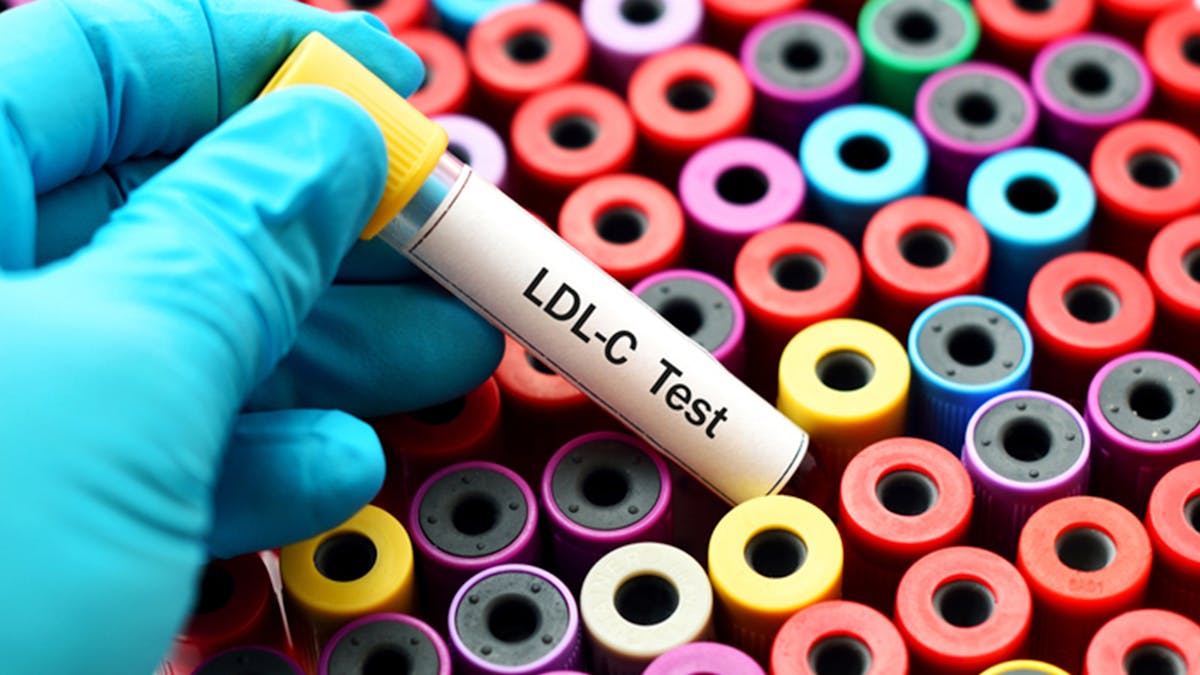Is elevated LDL cholesterol harmful?
Evidence based
Three key takeaways
LDL mattersElevated LDL levels increase heart disease risk. But the level of risk may surprise you. Read more
Put LDL levels in context
Elevated LDL is just one risk factor for heart disease and should be considered in the context of a comprehensive risk evaluation. Find out more
Are low carbers different?
Although unproven, elevated LDL in those following a low-carb diet may confer less risk than the same LDL in those eating a standard western diet. Here’s why
You’ve probably heard of low-density lipoprotein (LDL) cholesterol and how high levels are linked to a higher risk of cardiovascular disease. Medical societies recommend lowering LDL cholesterol to reduce heart-disease risk, and cholesterol-lowering medications are among the most widely prescribed medications in the industrialized world.1
However, some clinicians have begun asking the question: in people without existing heart disease, are there subsets of people where high LDL could be closely monitored, as opposed to automatically treated?
At Diet Doctor, we’ve scrutinized the science and the theories to better understand whether it’s at all reasonable to question whether all instances of elevated LDL merit the same level of concern. We hope this guide will help you better understand where nuance may exist in the evaluation of elevated LDL and overall cardiovascular risk.
Of note, this guide primarily focuses on those without existing cardiovascular disease — so-called primary prevention. When it comes to secondary prevention — treating people with known heart disease — we are not questioning the benefits of lowering LDL, which are well supported by the literature.


Elevated LDL cholesterol is associated with increased cardiovascular risk
Observational studies in the general population show an association between elevated LDL cholesterol and an increased risk of developing cardiovascular disease.2 This association is true of studies in the general population and those done in people with specific genetic mutations that increase LDL levels.3
In addition, genetic mutations that lower LDL levels correlate with a lower risk of cardiovascular disease.4
Furthermore, lowering LDL with medications can reduce cardiovascular risk.5 For example, statins, ezetimibe, and PCSK9 inhibitors each work to reduce cardiovascular risk.
A wealth of scientific data demonstrates that elevated LDL levels correlate with at least a small absolute increased risk of cardiovascular disease in the general population, with even stronger evidence for those with existing heart disease — so-called secondary prevention.
However, many people may be surprised to learn the small size of the absolute risk associated with elevated LDL in the general population. Likewise, the degree of benefit from lowering LDL is fairly consistent across multiple studies, but again it is quite small in terms of absolute benefit for primary prevention. It may help to explore the degree of harm or benefit more deeply.
The magnitude of risk from higher LDL
Studies suggest that an elevated LDL level could increase cardiac risk fivefold over 35 years.6 But what does this mean?
A fivefold increase is a relative increase, so if the baseline risk is very low, like 0.25%, then a fivefold risk is still small in an absolute sense. In this example, 0.25% risk goes up to 1.25%, for just 1% of increased absolute risk. With a higher baseline risk of a cardiac event, such as 5%, a fivefold increase is much more significant — increasing risk to 25%, for a 20% increase in absolute risk in this case.
However, other studies suggest LDL is not the most important predictor of heart disease.
One study found the risk of heart disease attributable to elevated LDL in women was significant, with a hazard ratio of 1.4. However, markers of metabolic health were far more predictive than LDL. For instance, a marker of insulin resistance had a much higher hazard ratio of 6.4; having high blood pressure or diabetes had significant hazard ratios of 4.6 and 10.7, respectively.7
Other studies suggest that lipoproteins rich in triglycerides — so-called “remnant cholesterol,” like VLDL particles — impact heart risk more than LDL cholesterol.8
In addition, some of the original data correlating elevated LDL with heart-disease risk showed that low HDL values correlated much more strongly than high LDL.9
So it appears that focusing on an elevated LDL level, without examining the broader picture of metabolic health, triglycerides, HDL, and remnant cholesterol, may not accurately capture risk. This is particularly true when the other markers are in the healthy range.10
The magnitude of LDL-lowering benefit
When interpreting the benefit of statin therapy, it is important to understand the difference between relative-risk reduction and absolute-risk reduction.
For example, one study suggests lowering LDL by 38 mg/dL (1 mmol/L) reduces relative cardiac risk by 21%.11 But, the absolute-risk reduction is much lower, showing a 1% reduction over five years — meaning that treating 100 people for five years will prevent one heart attack.
Other trials show a more significant effect, such as the West of Scotland study. But even at the higher absolute-risk reduction of 2.4% over five years, preventing one cardiac event requires treating 41 people for five years.12
And in lower risk individuals, the absolute benefit is even smaller.13
Many believe that the benefit will continue to increase beyond five years, but longer term, randomized controlled trial data are sparse.
From a public health perspective of treating millions of people and preventing tens of thousands of heart attacks, the magnitude of relative-risk reduction from LDL lowering is encouraging. But for the individual patient trying to decide if they should take a medication, the absolute benefit may seem less obvious.14
We also should note that not all LDL-lowering medications reduce cardiac events. One class of drugs, CETP inhibitors, showed an increase in cardiac events despite significant LDL lowering.15 Since the benefit of LDL lowering can be small, it may not take much of an added risk to undo the potential benefits of decreasing LDL.
None of this is meant to suggest that LDL is unimportant. On the contrary, LDL is clearly an important marker for heart disease risk. But the question we need to ponder is, how does LDL fit into the broader picture of cardiovascular risk?
Does elevated LDL actually cause heart disease?
Most medical societies agree that elevated LDL causes heart disease.16 However, a more nuanced hypothesis holds that LDL is necessary but not sufficient for the development of atherosclerosis.
LDL is involved in the formation of vascular plaque. Still, it is unclear whether LDL causes the initial vascular injury, or if another process (such as hypertension, vascular inflammation, or endothelial dysfunction from chronically elevated blood sugar) is required first, with LDL joining the process already in motion.
A detailed analysis of all the theories of atherogenesis is beyond the scope of this guide. But suffice it to say that atherosclerosis is a multistep process involving vessel injury, inflammation, a healing response, lipid oxidation, and plaque formation.17
We believe it is possible that elevated LDL does not cause atherosclerosis in patients who do not have metabolic dysfunction, chronic inflammation, or high remnant cholesterol levels. But — and it is a big “but” — we lack conclusive evidence to support this hypothesis.
Further, we recognize that there may indeed be a threshold (absolute) number for LDL that — when exceeded — directly drives cardiovascular disease, regardless of the existence of any metabolic abnormalities.
Patients in whom high LDL may not be as concerning
LDL increases the risk of cardiovascular disease on average in most published studies. However, the problem with averages is there are often subgroups that fall below the mean and do not experience the elevated risk.
Here are a few examples of studies suggesting certain groups are much less likely to have adverse health outcomes despite elevated LDL:
- In the 4S trial — a study using simvastatin in patients with a recent heart attack — the most significant benefit occurred in patients with elevated LDL and elevated triglycerides along with low HDL levels. There was no significant benefit of treatment for those with high LDL and normal triglycerides with normal HDL levels.18
- Retrospective analysis of the Framingham offspring data demonstrates that those with HDL above 65 mg/dL (1.7 mmol/L) have minimal to no increased heart-disease risk even with LDL levels above 220 mg/dL (5.7 mmol/L).19
- A Danish study reports that there was no difference in cardiac events for men with LDL above or below 170 mg/dL (4.47 mmol/L). Instead, risk increased with elevated triglyceride and lower HDL levels.20
- A study reports that over half of 60-year-olds with LDL above 190 mg/dL (5 mmol/L) and a coronary calcium score of zero maintained their calcium score of zero ten years later.21
- Observational studies in an older population — defined as over 65, 70, or 75 years old, depending on the study — demonstrate an improvement, or at least no decrease, in longevity with higher LDL levels.22
While none of these studies proves LDL is irrelevant to heart disease, they do suggest there are situations where elevated LDL doesn’t automatically mean a higher risk of heart disease. Some factors that may mitigate the risk of high LDL include:
- absence of metabolic disease such as insulin resistance
- normal HDL, triglycerides, and remnant particles
- mostly larger, less-dense LDL particles23
- the relative absence of oxidized LDL particles24
- age over 65 or 75 years
- absence of familial hypercholesterolemia
One other example deserves a special mention. What about those who have an elevated LDL in response to a low-carb diet? We explore the topic of low-carb hyper-responders in the next section.

Low carb LDL hyper-responders
Most studies of individuals eating a low-carb or ketogenic diet demonstrate no significant increase in LDL, on average.25 However, a minority of people may find their LDL cholesterol increases dramatically — these folks are so-called “low-carb hyper-responders.”
There is no formal definition for hyper-responders, but we suggest that anyone who starts a low-carb diet and experiences more than a 50% LDL increase and ends up at an abnormally high level is a hyper-responder.
The implications of being a hyper-responder are not clear at this time. Clinical experience suggests that many low-carb hyper-responders tend to have good metabolic health with normal HDL and triglyceride levels — precisely the cohort that appears to be at lower risk from elevated LDL.26
In addition, hyper-responders usually do not fit the clinical criteria for familial hypercholesterolemia — the most common population with markedly elevated LDL cholesterol.27 Therefore, it is not necessarily appropriate to assume hyper-responders should have the same clinical outcomes as those with familial hypercholesterolemia. The mechanisms by which the two groups develop elevated lipids are likely quite different.28
Unfortunately, it is premature at this time to generalize about the risk of low-carb hyper-responders.
You can read more about low-carb LDL hyper-responders and what we recommend in our more detailed evidence-based guide.
Suggested workup for elevated LDL
Enough data exist for us to question whether elevated LDL is harmful in all situations. For this reason, we recommend discussing with your doctor what your LDL level means for you as an individual, taking your entire clinical picture into account.
Some or all of the following tests may be appropriate to stratify your cardiovascular risk more accurately:
- advanced lipid panel including LDL size and level of oxidized LDL
- metabolic workup including glucose, HbA1c, fasting insulin, HOMA-IR
- lipoprotein(a) [Lp(a)] level
- coronary artery calcium score
- home blood pressure monitoring
- thorough clinical evaluation and possibly genetic testing for familial hypercholesterolemia
If you are looking for a doctor with more experience monitoring the above tests, you can check our Find a Doctor Map to see if you can find a good match near you.
Is elevated LDL cholesterol harmful? - the evidence
This guide is written by Dr. Bret Scher, MD and was last updated on June 19, 2025. It was medically reviewed by Dr. Michael Tamber, MD on December 1, 2021.
The guide contains scientific references. You can find these in the notes throughout the text, and click the links to read the peer-reviewed scientific papers. When appropriate we include a grading of the strength of the evidence, with a link to our policy on this. Our evidence-based guides are updated at least once per year to reflect and reference the latest science on the topic.
All our evidence-based health guides are written or reviewed by medical doctors who are experts on the topic. To stay unbiased we show no ads, sell no physical products, and take no money from the industry. We're fully funded by the people, via an optional membership. Most information at Diet Doctor is free forever.
Read more about our policies and work with evidence-based guides, nutritional controversies, our editorial team, and our medical review board.
Should you find any inaccuracy in this guide, please email andreas@dietdoctor.com.
Journal of the American College of Cardiology 2019: 2019 ACC/AHA guideline on the primary prevention of cardiovascular disease: A report of the American College of Cardiology/American Heart Association task force on clinical practice guidelines
[overview article; ungraded]European Heart Journal 2020: 2019 ESC/EAS guidelines for the management of dyslipidaemias: lipid modification to reduce cardiovascular risk
[overview article; ungraded]
↩Circulation 1998: Prediction of coronary heart disease using risk factor categories [observational study with HR<2, very weak evidence] ↩
Athersclerosis, Thrombosis, and Vascular Biology 2010: Genetic variants influencing circulating lipid levels and risk of coronary artery disease [overview article; ungraded] ↩
NEJM 2006: Sequence variations in PCSK9, low LDL, and protection against coronary heart disease [non-controlled study; weak evidence] ↩
JAMA 2016: Association between lowering LDL-C and cardiovascular risk reduction among different therapeutic interventions: A systematic review and meta-analysis [systematic review of randomized trials; strong evidence]
Journal of Clinical Lipidology 2016: A review of low-density lipoprotein cholesterol, treatment strategies, and its impact on cardiovascular disease morbidity and mortality [overview article; ungraded] ↩
Of note, these studies are complicated by confounding variables and modeling assumptions.
Journal of the American Heart Association 2019: Trajectories of blood lipid concentrations over the adult life course and risk of cardiovascular disease and all-cause mortality: Observations from the Framingham study over 35 years [observational study with HR<2, very weak evidence]
Another study found a 1.7-fold increase in cardiac mortality over 26 years. The same caveats apply regarding the baseline risk determining the absolute-risk reduction.
Circulation 2018: Long-term association of low-density lipoprotein cholesterol with cardiovascular mortality in individuals at low 10-year risk of atherosclerotic cardiovascular disease [observational study with HR<2, very weak evidence] ↩
JAMA Cardiology 2021: Association of lipid, inflammatory, and metabolic biomarkers with age at onset for incident coronary heart disease in women [observational study with HR<2, very weak evidence] ↩
Frontiers in Cardiovascular Medicine 2021: Association of increased remnant cholesterol and the risk of coronary artery disease: A retrospective study [observational study with HR<2, very weak evidence]
European Heart Journal 2021: Remnant cholesterol predicts cardiovascular disease beyond LDL and ApoB: a primary prevention study [observational study with HR<2, very weak evidence]
Journal of the American College of Cardiology 2020: Remnant cholesterol, not LDL cholesterol, is associated with incident cardiovascular disease [retrospecvtive evaluation of a RCT; weak evidence] ↩
The American Journal of Medicine 1977: High density lipoprotein as a protective factor against coronary heart disease [observational study with HR<2, very weak evidence] ↩
Scientific Reports 2021:
Triglycerides and low HDL cholesterol predict coronary heart disease risk in patients with stable angina[non-controlled study; weak evidence]European Journal of Preventive Cardiology 2020: Remnant cholesterol, coronary atheroma progression and clinical events in statin-treated patients with coronary artery disease
[non-controlled study; weak evidence]
↩Lancet 2012: The effects of lowering LDL cholesterol with statin therapy in people at low risk of vascular disease: meta-analysis of individual data from 27 randomised trials
[meta analysis of randomized trials; downgraded for lack of data transparency; moderate evidence] ↩NEJM 1995: Prevention of coronary heart disease with pravastatin in men with hypercholesterolemia. West of Scotland Coronary Prevention Study Group
[randomized trial; moderate evidence] ↩One often-cited drug trial promoted a 44% decrease in cardiovascular events with statin therapy. But the 44% decrease was a relative-risk reduction. In absolute terms, this was the same as saying there was a 0.5% absolute reduction in risk over two years. Therefore, you would need to treat 200 people with the medication for two years to prevent one cardiovascular event.
NEJM 2008: Rosuvastatin to prevent vascular events in men and women with elevated C-reactive protein
[randomized trial; moderate evidence] ↩BMJ 1998: Communicating the risk reduction achieved by cholesterol reducing drugs
[overview article; ungraded]Of note, the cardiac benefit of LDL lowering does not appear to be relegated to only statins. Many different medications have shown a slight reduction in cardiac events, including statins, ezetimibe, PCSK9 inhibitors, fibrates, and bile acid sequestrants.
Atherosclerosis, Thrombosis, and Vascular Biology 2015: Nonstatin Low-Density Lipoprotein-Lowering Therapy and Cardiovascular Risk Reduction-Statement From ATVB Council
[overview article; ungraded]
↩NEJM 2007: Effects of torcetrapib in patients at high risk for coronary events
[randomized trial; moderate evidence] ↩European Heart Journal 2017: Low-density lipoproteins cause atherosclerotic cardiovascular disease. 1. Evidence from genetic, epidemiologic, and clinical studies. A consensus statement from the European Atherosclerosis Society Consensus Panel
[overview article; ungraded] ↩American Journal of Pathology 2012: Plaque attack: one hundred years of atherosclerosis in The American Journal of Pathology
[overview article; ungraded] ↩Circulation 2001: Influence of low high-density lipoprotein cholesterol and elevated triglyceride on coronary heart disease events and response to simvastatin therapy in 4S [non-controlled study; weak evidence] ↩
Canadian Journal of Cardiology 1998: Cholesterol and lipids in the risk of coronary artery disease — the Framingham Heart Study
[observational study with HR<2, very weak evidence] ↩Metabolic Syndrome and Related Disorders 2003: Triglycerides, high-density lipoprotein cholesterol, and risk of ischemic heart disease: a view from the Copenhagen Male Study [non-controlled study; weak evidence] ↩
Atherosclerosis 2021: Atherosclerotic cardiovascular disease events among statin eligible individuals with and without long-term healthy arterial aging [non-controlled study; weak evidence] ↩
These studies do not prove that elevated LDL is beneficial. Still, it may be enough to raise awareness that not all instances of elevated LDL are the same, and some cases require a more nuanced approach.
BMJ Open 2016: Lack of an association or an inverse association between low-density-lipoprotein cholesterol and mortality in the elderly: a systematic review [analysis of observational studies with HR<2, very weak evidence]
Archives of Internal Medicine 2003: High-density vs low-density lipoprotein cholesterol as the risk factor for coronary artery disease and stroke in old age [observational study with HR<2, very weak evidence]
Journal of the American Geriatrics Society 2020: Associations between serum levels of cholesterol and survival to age 90 in postmenopausal women
[observational study with HR<2, very weak evidence]Lancet 2001: Cholesterol and all-cause mortality in elderly people from the Honolulu Heart Program: a cohort study
[retrospective study with HR<2, very weak evidence] ↩PLoS One 2020: Association of small, dense LDL-cholesterol concentration and lipoprotein particle characteristics with coronary heart disease: A systematic review and meta-analysis
[analysis of observational studies with HR<2, very weak evidence] ↩Canadian Journal of Cardiology 2017: Association between circulating oxidized LDL and atherosclerotic cardiovascular disease: A meta-analysis of observational studies
[meta analysis of observational studies with HR<2, very weak evidence] ↩Nutrition Reviews 2019: Effects of carbohydrate-restricted diets on low-density lipoprotein cholesterol levels in overweight and obese adults: a systematic review and meta-analysis
[systematic review of randomized trials; strong evidence] ↩This statement is based on the consistent clinical experience of practitioners familiar with low-carb nutrition. [weak evidence] ↩
A familial hypercholesterolemia diagnosis is usually made using scoring tools such as the Simon Broome or Dutch criteria, which may include a genetic test for familial hypercholesterolemia. While discussing the diagnosis of familial hypercholesterolemia is beyond the scope of this guide, suffice it to say that the diagnosis should not be made based solely on an elevated LDL level. A history of heart disease, physical exam findings of high cholesterol, family history of high cholesterol or heart disease, and genetic testing should all be considered when making a diagnosis. ↩
A detailed discussion of why hyper-responders are thought to develop very high LDL is beyond the scope of this guide. We do cover it in greater detail in our hyper-responder evidence-based guide. ↩








